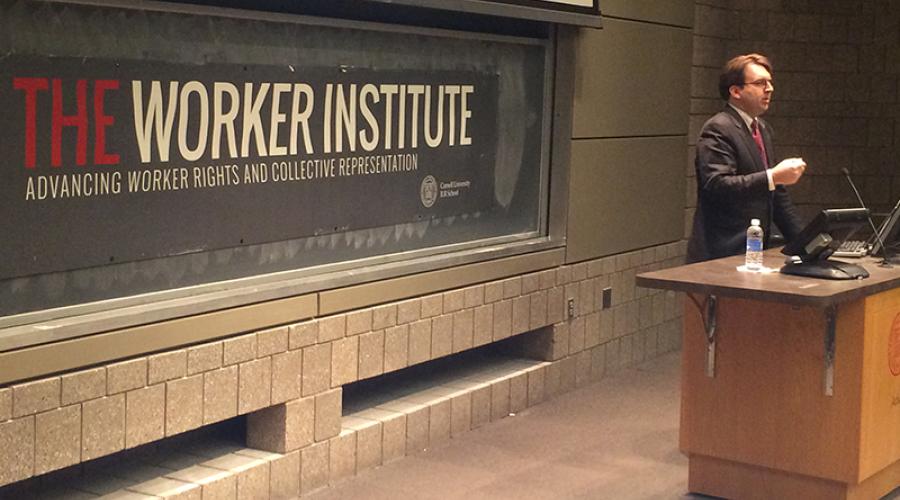
Worker Justice
“Solidarity does work,” Jeffrey Vogt, director of the International Trade Union Confederation Legal Department, said Thursday at ILR. “We’ve seen it over and over again, even when things look quite bleak.”
“It may take some time, and the importance of international solidarity, solidarity of trade unions, students and others have been absolutely critical to make this work,” he said.
Presenting the keynote address at ILR’s Union Days, Vogt provided the student and faculty audience with a broad perspective of organizing and worker justice at the international level, highlighting comparisons across the globe of challenges and successes.
Ileen DeVault, ILR professor of labor history, stressed that international perspective is crucial as “the ‘globalization’ of our economy and our workforce has been going on for quite a while.”
“Workers are migrating around the world to find work, only to come up against brutal treatment because of ‘official’ policies or because of the lack of such,” DeVault said. “This has been an issue for a long time, but both national politics and world events have brought it into sharper focus this year.”
According to Vogt, “workers around the world, including here in the United States, are confronting several serious challenges in the realization of fundamental labor rights, or for that matter, simply getting paid for their work.”
“Economic insecurity is a reality for the majority of workers around the world,” he said. “Unemployment and underemployment remain, in many parts of the world, and those who do have work have seen wages stagnate and working conditions deteriorate.”
Vogt stated that there are several major challenges workers are facing across the globe.
Issues of inequality and global unemployment or underemployment fester as governments opt for austerity reforms that harm collective bargaining, a basic right for workers, he said.
A lack of accountability in global supply chains strains multinationals to cut costs to compete, inevitably increasing pressures on wages and working conditions, Vogt said.
Climate change has intensified the need for a clear path to transitioning millions of workers around the globe from ‘dirty’ jobs to ‘clean’ jobs. This has increased rhetoric on both sides of the political spectrum, but, as Vogt pointed out, “there are no jobs on a dead planet.”
“Enough of the bleakness, let’s spend a little bit of time talking about some of the impressive gains that have been made by workers around the world,” he said.
According to Vogt, there are several key examples of victories in the worker rights movement that have occurred in recent years.
The Bangladesh Accord, an independent legally binding agreement designed to improve worker health and safety in the country’s garment industry was signed by trade unions and 200 brands. The Global domestic workers movement has secured rights and protections for the millions of domestic workers around the world, reforms that have been adopted by 22 countries.
Cambodian garments and footwear workers organized to demand proper pay, and after a hard-fought battle, wages per month almost doubled, helping the industry grow, despite initial calls that pay increases would destroy it.
Also, the Iraqi parliament passed legislation for labor laws allowing collective bargaining, limits on child labor, sexual harassment prevention and discrimination.
Vogt said there is still a lot of work to be done as “the era of the cheap t-shirt has not ended.”
“Students here at ILR who are interested in trade unions, I encourage you to stick with the labor movement whether it’s here in the United States or internationally,” he said. “I think it’s truly rewarding work and I’m glad I’m part of it.”
